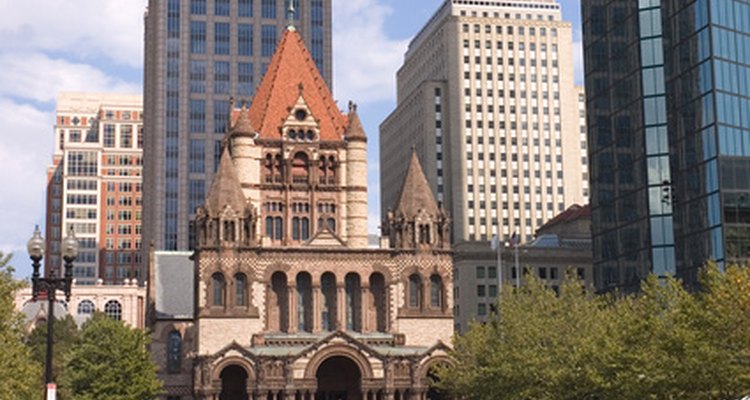
Numerous grants are available to historic churches in the United States. Often, churches are the oldest buildings still standing in their communities and are important not only to churchgoers but to all fellow inhabitants. From the extravagant Catholic churches of early colonists to humble Great Depression houses-turned-churches, numerous private and federal grants are available to make sure these special buildings stay right where they are.
Aid for Revolutionary War Landmarks
Thomas Jefferson called for a "wall of separation between Church & State" in 1802 so that American taxpayers from very diverse backgrounds wouldn’t have to pay for the preservation of churches they did not associate themselves with. However, any church built or standing since the Revolutionary War (1775-1783) can apply for federal or state aid to help with structural repairs, electricity and even removing pests like bats or termites. The U.S. Department of the Interior began giving grants to pre-Revolutionary War churches in 2003, which started with the Old North Church in Boston receiving $317,000.
Help From Cities and States
Most states have departments of heritage or landmark preservation, and churches can apply for grants via phone, in person or online. About two thirds of repair costs are usually covered, and the rest of the money has to be raised by the churches' efforts. Detailed information about state and city grants available to churches are usually found on the state’s or city’s official website. New York, Seattle, Boston, San Francisco and Omaha as well as Virginia and California are just some of the places whose websites have information on grants.
Federal Grants for Churches
A great website for church grants is Grants.gov, which offers financing to churches that participate in disaster prevention and relief efforts, youth mentoring, and numerous other community service projects. There are also a number of grants available specifically for historical churches (simply type "church" in the basic search box).
501(c)(3) Status Is Required
Before even beginning the lengthy grant-application process, a church is required to be registered with the IRS as a tax-exempt, not-for-profit organization. 501(c)(3) is the section of the tax code that covers religious organizations; churches built after 1969 can apply for exemption under that title via Form 1023. Buildings established as churches before 1969 are automatically issued 501(c)(3) status.
Related Articles
Free Things to Do in Fredericksburg, ...

Government Grants for Churches

Free Grants for Churches

Grants for Christian Counselors

Grants for Private Christian Schools

Federal Grants for Church Renovations

How to Apply for a Commercial Loan for ...

What Is Transitional Housing?

Government Funding for Taking Care of ...

Who Gives Donated Vehicles to the Poor?

How to Get Rental Assistance for Seniors

Does a Married Woman Need Her Husband's ...

Faith-Based Grants for Starting a New ...

Grants to Help Churches

How to Homestead in Montana

How to Start a Christian School

Marriage Requirements in International ...

Who Can Perform Weddings in New Jersey?

Louisiana Justice of the Peace Wedding ...

How to Plan a Tent Revival
References
Writer Bio
Based near Toronto, Canada, Veronica Starovoit has been writing stories and articles for periodicals since 2004. She writes travel pieces for LIVESTRONG.COM and her work has been published on websites such as eHow, Answerbag and others. She has a Bachelor of Arts in English from York University and is taking a postgraduate co-op program in technical writing.
Photo Credits
romanesque church image by Pierrette Guertin from Fotolia.com